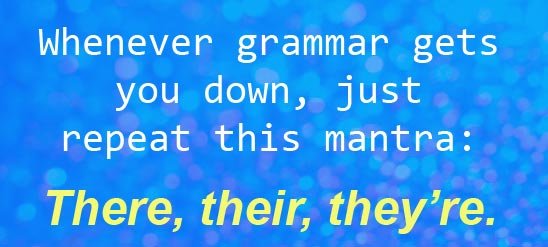Write It Right! Free Grammar Resources for Writers.

Sometimes even the most erudite writers use bad grammar or misspell words. Hey it happens. English is a living language after all and subject to change. Dictionaries frequently bow to popular misusage of words and then permanently alter their acceptable meanings (podium, ironic, fortuitous), and as any person that grew up with a smart phone as an extra appendage will tell you: more and more chat-speak is creeping into acceptable usage. On top of that, the Internet creates crossover platforms for UK English writers and American English writers, so clashes over grammar and spelling are daily occurrences. While spelling is often easy enough to correct in your favorite word processing program, grammar usage and punctuation often fall into style guidelines that are different from publisher to publisher. So where does one go for answers to the hard questions about proper grammar? Oh, and let’s find those answers on the cheap.
Here are my picks from the bounty of the Internet. I favored websites for free content, but I included a few apps for mobile devices with the caveat that (truly) free apps are often poorly concocted or buggy:
grammarbook.com
Features: free lessons, tests, videos, and a weekly blog
Moderated: yes
Cites sources: yes
This site is built around the work of Jane Straus, author of The Blue Book of Grammar and Punctuation, but happily her website offers up amazing resources that don’t require you to purchase her opus. The site’s lessons are broken down into rules of grammar and rules of punctuation, and most importantly, the site is created with professional writers in mind. Too many of the grammar apps for Android and iOs that I tested were designed primarily for people learning English as a second language, and they failed to address the concerns of professional writers.
I scanned through GrammarBook’s blog, and was delighted by the factual yet entertaining way the author writes about English grammar. In the blog, Pleonasms Are a Bit Much, originally published January 26, 2016, I learned about pleonasms–words included in a sentence or a phrase that are redundant.
Examples from the blog include: “‘GED graduation begins with unexpected surprise’ Is it a surprise if it’s expected?” and “‘Tips from a self-confessed project management nerd’ Too bad the author of this post wasn’t also a language nerd: self-confessed is a classic pleonasm.”
 quickanddirtytips.com/grammar-girl
quickanddirtytips.com/grammar-girl
Features: free weekly blog (RSS feed) and podcasts
Moderated: undetermined
Cites sources: yes
Mignon Fogarty is the flesh and blood person behind the witty, declarative voice of Grammar Girl, and her website features blogs on grammar as well as podcasts of her content. Blog topics typically fall into either vocabulary (with discussion on etymology) or grammar and usage (often with a mnemonic device to facilitate later recall.) Here are some of her most popular blog topics: How to Use Semicolons, Active Voice Versus Passive Voice, How to Use a Hyphen, I.e. Versus E.g.
What I like best about the website is the podcasts: they are well-produced with sound bites and music clips and feature Fogarty’s smooth, enunciating voice; and being podcasts, I can listen to them in my car during a commute or road trip. Since I couldn’t find examples where Fogarty interacted with comments to her blogs, I decided to say that moderation of the comments was undetermined (whereas grammarbook.com’s Straus does respond directly to comments), but Fogarty’s ability to utilize pop culture references makes her blog shine.
In her post “Lay Versus Lie”, she quotes the bad grammar found in the music of both Eric Clapton and Bob Dylan, “To say ‘lay down Sally’ would imply that someone should grab Sally and lay her down. If he [Clapton] wanted Sally to rest in his arms on her own, the correct line would be ‘lie down Sally.'” “If you’re more of a Bob Dylan fan, you can remember that ‘Lay Lady Lay’ is also wrong. The lyrics should be ‘Lie lady lie, lie across my big brass bed.'”
 painintheenglish.com
painintheenglish.com
Features: searchable forum, ability to post a question
Moderated: yes
Cites sources: usually
Pain in the English is a website that offers a paid proof-reading service but also has a free forum for discussion of grammar topics, and the proofreaders often post an answer with a cited reference to questions in the forum. You can use a search box to see if your particular grammar question has been asked before (it probably has), but be forewarned: the forum also allows the posting of misinformation.
Because this website lacks a blog and any instructional section with rules of grammar, its value as a resource is limited purely to discussion, but the discussions can be fascinating! In the forum I discovered clashes of old and new grammar rules, arguments about UK English versus American English, and debates about revisions to popular style manuals. The forum reminded me that I’m not alone in lamenting changes in style and word definitions, but I also enjoyed the forum as a space to witness the debate that ultimately shapes changes in the English language.
From the Pet Peeves category, I found this recent question: “Predilection with “get” or “got”. Just how screwed has our language become? Why do we hear phrases like: “If he gets in contact with you” when there are simpler and more meaningful phrases like: “If he contacts you”.
Popular answer: “Some people of a certain generation and background (like me) can recall being told at school NEVER to use this so-called “ugly” (ie lower-class) word. Nonetheless, for examinations/academic writing I do still teach my students to consider using a more precise word such as “obtain/receive/become”, if only to demonstrate a wider lexis. However there are phrases where “get” is the only natural choice: “They became married” would sound quite odd.”
English Grammar app by Maxlogix, Inc (Android, iOS)
Features: free basic grammar lessons
This app appeals primarily to people who speak English as a second language, and the content is organized with them in mind. There are 43 lessons available to read as well as some extra lessons in verb tenses and conversational English. I don’t actually recommend this app for professional writers, but it’s free; and my experience with testing free grammar apps leads me to conclude this is one of the better quality apps since all its content is truly free.
Oxford A-Z of English Usage app (Android, iOS)
Features: database of grammar, pronunciation and usage
The Oxford series of apps are not free, but they do offer a 30-day free trial. The trial period, however, comes with a nag screen asking you to purchase the full version every time you open a subject, and it is supremely annoying. That said, this app is well researched and comprehensive and may be worth the $15 price tag, but I found the app too poorly organized to be useful. I suppose that if you decided to read a subject/lesson every day, your grammar would eventually improve. One subject in the app dealt with the word “bruschetta” and merely advised that the mispronunciation of the word (broo-shet-uh) instead of the correct pronunciation (broo-sket-uh) is likely to end up the favored pronunciation.
Oxford A-Z of Grammar & Pronunciation app (Android, iOS)
Features: database of grammar, pronunciation and usage
This companion app in the Oxford series is likely the most helpful one for professional writers. The app’s lessons utilize technical language that may deter some users, but the technical terms typically have links to definitions, so with patience you will learn the proper terminology for parts of speech and grammar if you don’t already know them. Like the previous Oxford app, the lessons are disorganized: they appear in one sprawling alphabetical list. Here’s a sample lesson about past perfect continuous verb tense: “This tense is formed by ‘had been’ followed by the present participle: She had been writing. Uses: to refer to an action that continued over a period of the past…”
More free grammar apps I do NOT recommend:
Grammar Up by webrichsoftware: Only some content is free, and the tests are geared for the TOEFL (English as foreign language).
Grammar App by Tap to Learn: The user interface is easy to use, but lessons only encompass basic grammar; and some of the word choices derive from UK English (the infamous “cock” as opposed to “rooster”). Lessons tend to encourage rote memorization and skimp on explanations.
English Grammar by Zayan Infotech: Sadly, this app was little more than a clone of the English Grammar app by Maxlogix, Inc., and worse, it had advertisements. Just avoid this one if you are searching for a grammar app.
My conclusion with the range of grammar apps I tested was that paid apps are best, and free apps just aren’t helpful for writers. Can you feel my disappointment?
So many of us grew up with a favorite resource for English grammar and writing, and it’s easy to get stuck in a writing style as dated as the original book from which we first learned. In high school, my holy text was Strunk and White’s Elements of Style (3rd Edition), but that old book you once loved (or hated) has likely been revised; so I invite you to spend some time checking out the above free resources and join or just follow the debate. Even if you have a passel of screaming kids in tow, you can still experience a moment of grammar Zen by listening to a Grammar Girl podcast on-the-go, and please, never take grammar so seriously that you give yourself an ulcer or stress-induced hemorrhoid.
By Spriggan Radfae
Follow us!Share this post with your friends.


